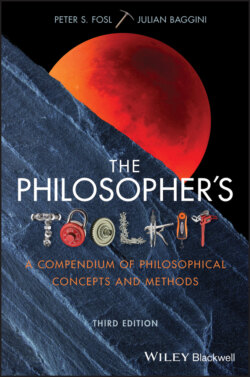Читать книгу The Philosopher's Toolkit - Julian Baggini, Julian Baggini - Страница 47
Exceptions to the rule?
ОглавлениеBut is inconsistency always undesirable? Some people are tempted to say it is not. To support their case, they present examples of statements that intuitively seem perfectly acceptable yet seem to meet the definition of inconsistency. One example might be:
It is raining, and it is not raining.
Of course, the inconsistency might be only apparent. What one may actually be saying is not that it’s raining and not raining, but rather that it’s neither properly raining nor not raining, since there is a third possibility – perhaps that it is drizzling, or intermittently raining – and that this other, fuzzy possibility most accurately describes the current situation (3.1).
What makes the inconsistency only apparent in this example is that the speaker is shifting the sense of the terms being employed. Another way of saying the first sentence, then, is that, ‘In one sense it is raining, but in another sense of the word it is not’. For the clauses composing this sentence to be truly inconsistent, the relevant terms being used must retain precisely the same meaning throughout. But, when you do unearth a genuine logical inconsistency, you’ve accomplished a lot, for it can be very difficult if not impossible to defend the inconsistency without rejecting rationality outright. There are poetic, religious, and philosophical contexts, however, in which this is precisely what people find it proper to do.
